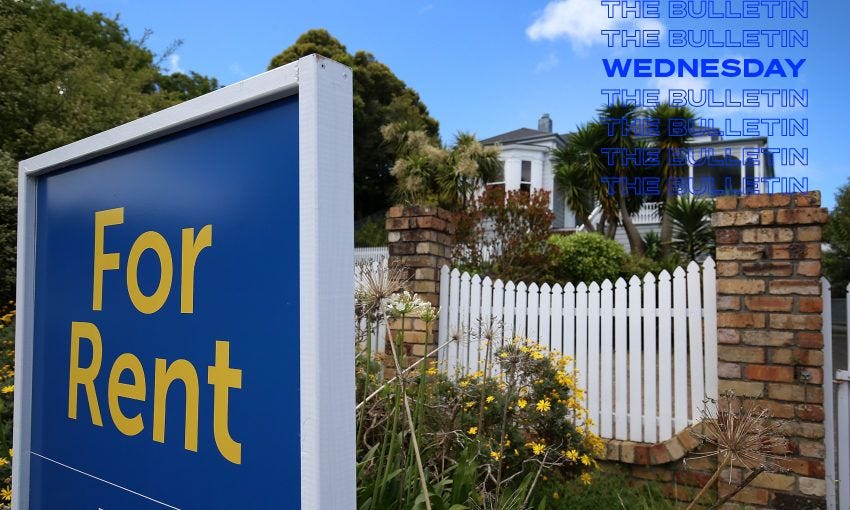Two big changes for landlords and tenants
The government has detailed new interest deductibility rules and rewritten the country’s leases to help tenants during future lockdowns
Mōrena and welcome to The Bulletin for Wednesday, September 29, by Justin Giovannetti. Presented in partnership with Z Energy.
In today’s edition: Could the vaccine programme have started earlier, more MIQ rooms released, Marton’s bad water, but first, changes to the housing market.
The government says a tax change won’t fix housing, but it could help. (Getty Images)
A 20 year definition of new for the country’s houses. A cornerstone of the government housing programme when it was unveiled in March was a significant law change on interest deductibility. Ministers announced then that the amended law would prevent many residential property investors from deducting interest as an expense when paying taxes, in a bid to push more investment into new builds. Yesterday, the change was detailed and new builds will be exempt, with “new” defined expansively as 20 years from when houses receive a compliance certificate. For investors with older properties, the deduction phase-out starts Friday. Interest, quite appropriately, has written about all the details unveiled yesterday.
This one tax change will raise $1 billion over the next four years. Stuff reports that some experts concluded the details of the change to interest deductibility were more generous for investors than they’d expected, but it’ll still increase many individual tax bills by thousands in the coming years. A Treasury analysis had forecast that the overall tax take from property investors could increase by $800 million annually once the deduction is fully phased out for older properties, which is due to happen by 2025.
What will this mean for rents? There could be another concession in the coming months as housing minister Megan Woods unveiled yesterday that she’s considering creating new exemptions for purpose-built rentals that could last longer than two decades and be more generous. While both Act and the National party have warned that rents will increase from Friday because of the deduction change, revenue minister David Parker rejected the suggestion, stating in effect that rents are already as high as landlords can push them. Rents, he said, aren’t set by costs facing landlords anymore, but are “by and large set by the ability of people to pay”.
Changes are coming to commercial and residential leases. Two hours after the interest deductibility rules were unveiled yesterday, the government sent an unexpected press release that it was rewriting tenancy agreements without notice. According to Stuff, a clause will now been inserted into commercial property leases requiring that only a “fair proportion” of rent be paid when tenants are impacted by Covid-19 restrictions. Landlords who can’t agree with tenants on what constitutes a fair rent will be forced into arbitration. The rules came into force yesterday, almost immediately. Also, residential tenancies can no longer be terminated under level four and it’ll be easier for ministers to create new restrictions on landlords.
Angered, the Property Council put out a statement calling the sudden change “a kick in the teeth for the backbone of the nation”.
The handbrake has been removed. Labour announced a similar plan last year after the first lockdown, but was blocked by coalition partner New Zealand First. At that time, then deputy prime minister Winston Peters had said that forcing arbitration on owners would violate the sanctity of commercial contracts. A voluntary scheme was put forward . In a story worth rereading, The Spinoff wrote about businesses headed towards bankruptcy and landlords who were unwilling to drop rents.
If you like what you’re reading, we need your support. The Spinoff is doing our utmost to keep you updated on Covid-19 related news. Every dollar our members contribute directly funds our editorial team and is devoted to ensuring we do more. Click here to learn how you can support the team today.
Could New Zealand have purchased more vaccines earlier? Pfizer has called a claim by Sir John Key “incorrect and baseless” that $40 million would have bought the country priority access to the Covid-19 vaccine, according to Newsroom. The company said no one has paid a premium for “priority delivery” and it was fulfilling its contract with New Zealand. The pharmaceutical giant didn’t explain the difference between priority and earlier delivery. As the NZ Herald (paywalled) has reported, countries that wanted earlier deliveries paid more. Kate MacNamara’s analysis for the newspaper is a revealing look at the different pressures the government’s negotiating team faced as it signed deals with vaccine makers.
The Covid numbers: 8 new community cases were reported yesterday in Auckland and 42% (5) of the previous day’s total were in the community while infectious. There are now 203 active cases. 40,706 people were vaccinated on Monday, of which 70% were second doses.
The Spinoff’s Covid data tracker has the latest figures.
Another 3,800 MIQ rooms were released yesterday and over 30,000 people tried to get one. The country's border system is once again being criticised by tens of thousands of people who unsuccessfully tried to get a place in managed-isolation through the government's lottery, according to the NZ Herald. The weekly stories are a mixture of desperation and heartbreak. The government has said the border could open up next year once the country hits higher vaccine levels. Unfortunately, it seems the vaccination programme has now stalled out with about 75% of the eligible population getting a jab. As Stuff explains, this was entirely foreseeable and the government needs a plan, now, to get things moving again.
The battle of the other Covid plans has started with Act releasing its Covid 3.0 programme. Sir John Key released his musings over the weekend, National’s plan is coming this morning, but David Seymour released his programme yesterday with a focus on life after lockdown. RNZ reports that he's released a five step process to move away from “chronic fear” and lockdowns. Seymour has called for an end to “eradication,” not the word experts use to describe the country's elimination strategy; isolating only individuals and not regions; a clear plan to end restrictions by Christmas; an end to a centralised approach and a new campaign that is fear free.
University of Otago to slash costs because international students aren't coming back soon. The Otago Daily Times reports that the university will launch a voluntary redundancy scheme next week because its financial picture is worsening. The university had expected international students to return by next year, but now says that's unlikely before 2023 and it could take a decade for numbers to recover. The cost of moving students and staff out of the main Wellington campus building last month due to earthquake risks didn’t help the university’s balance sheet either.
There's something foul in Marton's water. Locals have been buying bottles or driving to Whanganui, because the town’s tap water is just so “foul tasting”. Residents had been using a special filtered supply set up by council, but the outdoor tap has been closed under level two, according to the Manawatū Standard. The poor water has been a problem for decades and residents say they can smell the algae when they take a shower. The town’s woes could soon become a problem for the government’s proposed three waters programme. Labour and National are now scrapping in parliament over whether the package can go forward despite widespread opposition from councils.
Got some feedback about The Bulletin, or anything in the news?
Get in touch with me at thebulletin@thespinoff.co.nz
The cast of season three of RuPaul’s Drag Race UK (TVNZ/BBC)
Right now on The Spinoff: Sam Brooks writes at the start of another British season that RuPaul’s Drag Race UK brings needed brashness to the show. George Driver makes the case for the South Island to break away, from the world. Chris Schulz worries about whether Shortland Street can get rolling again after lockdown. Colin Peacock investigates claims that Covid-19 is compromising cancer care in the country's hospitals. Tina Tiller shares her vaccination experience in a delightful essay that’s a rare example of writing with voice and heart.
For a longer read today, the ‘British apocalypse.’ Black swan events are big historic shocks that are supposed to happen infrequently, maybe once a century. They come out of nowhere and leave an unpredictable trail of damage. The UK is now being swarmed by a number of black swans simultaneously and The Telegraph (soft paywall) has written about the government’s efforts there to try and get ahead of a long and confounding list of problems. It's not just the pandemic, and climate change and disorder in the international system, as well as collapsing fuel supplies and supermarkets running dry, but it’s all of that, all happening at once. Here’s a sample:
So how has it come to this? Why are so many Black Swan events coming at once? And what does it say about the UK’s emergency planning that we were not ready for them?
Professor Bent Flyvbjerg, a fellow of St Anne’s College, Oxford and an expert on power and rationality in decision making, said we are all prone to “Black Swan blindness”. He says: “Our brains are not well suited for detecting extreme risks.”
Because we focus on the here and now and tend to discount the future, “your biggest risk is you”.
Moana Pasifika to make Mount Smart stadium home. The team has confirmed that they've locked in the stadium as their home until 2028, One News reports. The team eventually plans to start playing more games in the Pacific islands, especially Samoa and Tonga. But with pandemic restrictions, Auckland will be it for some time. The team will start playing in February. The other new Pacific addition, Fiji Drua, will start its life in Australia and remain there until Covid-19 restrictions lift.
That's it for The Bulletin. If you want to support the work we do at The Spinoff, please check out our membership programme.







